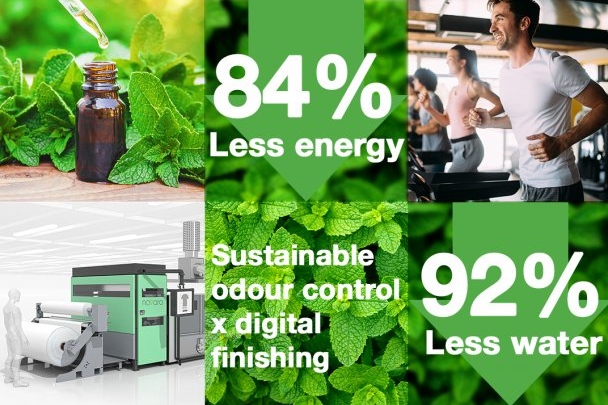

HeiQ
HeiQ‘s new Life technology derived from peppermint oil uses 84 percent less energy and 92 percent less water to give sustainable and lasting smell control to fabrics when applied with Alchemie‘s Novara digital finishing system.
Odor-causing bacteria are prevented from growing on the textile surface by HeiQ Life, keeping clothing fresh, clean, and comfortable. The treatment is ideal for clothing but may also be used on household textiles. It is safe to use on all textiles and works well with additional finishes such as fabric softeners and wicking agents. It can withstand up to 50 washes.
When opposed to the traditional padding technique, Alchemie’s Novara employs high velocity jetting to produce significant energy and water savings. Novara used 0.4 kWh of energy and 0.06 liters of water per kg in testing, compared to 2.6 kWh of energy and 0.8 liters of water using a padder system.
A low-energy, single-sided digital application technique allows for the application of functional finishes at up to 20 times the concentration of traditional procedures – with more uniform application and greater quality.
Simon Kew, managing director of Alchemie, said that consumers are all too aware of the need to increase sustainability, but brands and manufacturers must lead the shift and invest in more sustainable textile production processes. Around one million tons of chemicals are used each year to provide functional finishes to garments and household textiles. The textile sector is one of the most polluters in the world, but it is also one of the most capable of bringing about significant and rapid change.
Kew added that with HeiQ’s plant-based odour control and their low energy, digital finishing technology, they provide high-performance sustainable finishing that drastically reduces energy, water, and environmental impact while simultaneously lowering manufacturing costs.
Carlo Centonze, co-founder and CEO of HeiQ, said that consumers often wash clothing when they smell. Because washing accounts for more than 30% of a garment’s environmental footprint, odor-free fabrics will be cleaned less frequently and with fewer resources.
Panda Biotech has partnered with TDMI Twin Dragon to unveil a groundbreaking hemp denim collection crafted from 100% American-grown industrial…
Serge Ferrari Group has unveiled Batyline (Stam) Skin Feel, a new addition to its acclaimed upholstery collection designed for both…
Soorty, a Pakistani denim manufacturer, has announced that its Soorty Organic Cotton Initiative is now officially recognised by the Organic…
Modern Meadow has partnered with Bellroy to introduce its Innovera biomaterial, formerly known as Bio-Vera, into a new range of…
Re&Up has entered into a strategic partnership with Italian yarn spinner Marchi & Fildi to co-develop a new generation of…
Unifi has unveiled Repreve with CiClo technology, combining recycled polyester and nylon with biodegradable technology to help tackle microfibre pollution.